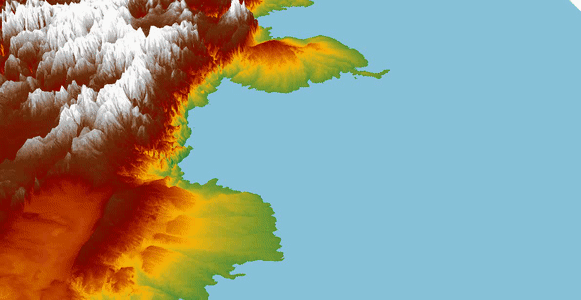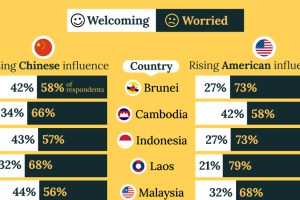Drainage Basins of the World’s Longest Rivers
Most of the earth’s surface is covered in water, but less than 1% of it is the fresh water that makes up the rivers and lakes we’re familiar with.
The water we encounter in life is moving through the stages of the water cycle. And even though rivers make up a tiny portion of all fresh water, they’re still one of the most visible parts of that cycle, especially for the billions of people who live in cities and towns built alongside them.
Of course, rivers don’t just appear out of nowhere. They’re the end result of water’s land-based journey–the product of many compounding inflows collected within a drainage basin.
The map above, from Reddit user r/CountZapolai, illustrates how massive the drainage basins can be for the world’s longest rivers.
What is a Drainage Basin?
A river’s drainage basin is defined as the area of land where precipitation collects and drains off, feeding the flow of rivers and their tributaries. Simply put, this is the process of water draining from higher points of land to lower laying areas–as demonstrated by the animation below.

In the case the world’s longest rivers, these drainage basins can span across entire continents and cross many international borders.
Fueling the World’s Longest Rivers
The longer a river system gets, the more terrain it passes through. It comes as no surprise then that the longest rivers are supported by immense drainage basins.
Here are the world’s top 10 longest rivers, and the size of their respective basins:
| Rank | River system | Length in miles (km) | Drainage area in miles² (km²) | Outflow | Countries in basin |
|---|---|---|---|---|---|
| 1 | Nile | 4,130 (6,650) |
1,256,591 (3,254,555) |
Mediterranean | 🇪🇹🇪🇷🇸🇩🇺🇬🇹🇿🇰🇪🇷🇼🇧🇮🇪🇬🇨🇩🇸🇸 |
| 2 | Amazon | 3,976 (6,400) |
2,702,715 (7,000,000) |
Atlantic Ocean | 🇧🇷🇵🇪🇧🇴🇨🇴🇪🇨🇻🇪🇬🇾 |
| 3 | Yangtze | 3,917 (6,300) |
694,984 (1,800,000) |
East China Sea | 🇨🇳 |
| 4 | Mississippi | 3,902 (6,275) |
1,150,584 (2,980,000) |
Gulf of Mexico | 🇺🇸🇨🇦 |
| 5 | Yenisei | 3,445 (5,539) |
996,143 (2,580,000) |
Kara Sea | 🇷🇺🇲🇳 |
| 6 | Huang He (Yellow River) | 3,395 (5,464) |
287,646 (745,000) |
Bohai Sea | 🇨🇳 |
| 7 | Ob–Irtysh | 3,364 (5,410) |
1,154,445 (2,990,000) |
Gulf of Ob | 🇷🇺🇰🇿🇨🇳🇲🇳 |
| 8 | Río de la Plata | 3,030 (4,880) |
997,175 (2,582,672) |
Río de la Plata | 🇧🇷🇦🇷🇵🇾🇧🇴🇺🇾 |
| 9 | Congo | 2,922 (4,700) |
1,420,856 (3,680,000) |
Atlantic Ocean | 🇨🇩🇨🇫🇦🇴🇨🇩🇹🇿🇨🇲🇿🇲🇧🇮🇷🇼 |
| 10 | Amur | 2,763 (4,444) |
716,220 (1,855,000) |
Sea of Okhotsk | 🇷🇺🇨🇳🇲🇳 |
Note: There is debate about the actual length of certain river systems. See a more comprehensive range of estimates here.
These 10 longest rivers alone are fed by a land area equivalent to the size of Africa.
Of those, the Amazon Basin is the largest in the world by far, covering one-third of the South American continent.
River Drainage Basins and Humanity
The fact that huge population centers sit at the terminuses of many of these key rivers is a testament to how important watersheds are to our survival. Only 10% of the global population lives further than six miles away from a surface freshwater body, and more often than not, that fresh water comes in the form of a river.
Noting where rivers begin their journey is also important as well. In the case of Tibet, many of the world’s longest rivers are fed by drainage basins that begin in the region. In fact, six of Asia’s major rivers begin on the Tibetan Plateau, meeting the basic needs of billions of people.
By illustrating the world’s longest rivers and their drainage basins, maps like this one help put into perspective the breathtaking complexity of Earth’s hydrological cycle.





